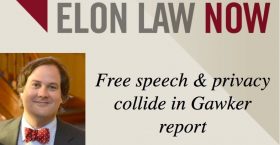Elon Law Professor Enrique Armijo examines Gawker’s recent reporting and probes the line between free speech and privacy rights in an Elon Law Now commentary.
 Professor Armijo’s commentary follows:
Professor Armijo’s commentary follows:
“On July 17, the news and gossip website Gawker did something it had basically never done before: retract a story. The piece, which had run the night before at around 8pm EST, outed a private married man with three children for soliciting a male escort. According to the story (which the man denies), after their tryst had been arranged, the escort learned that the man was the brother of a former high-level member of the Obama administration. The escort then insisted that the man use his government contacts to intervene in a housing dispute with the escort’s landlord. When the man declined and called off their date, the escort threatened to go to Gawker to out the man and his solicitation. And Gawker, which protected the escort’s identity, obliged, likely ruining the man’s life and possibly acting as an accessory to, or at least facilitating, an attempt at blackmail.
“The timing of Gawker’s story and its retraction are curious, and likely unfortunate, for the company. In October, Gawker Media will face a jury trial in Florida on a claim brought by former professional wrestling champ Hulk Hogan. Gawker obtained a privately made tape of Hogan having sex with his friend’s wife in the friend’s bedroom, and then edited the tape and posted it to its website. Hogan has sued the company for $100 million in damages based on the invasion of privacy-based tort called public disclosure of private facts, which bars outrageously divulging matters about a person’s life that the person has previously kept private. Gawker, wrapping itself in the First Amendment, claims that Hogan is a public figure, which is indisputable, and that he placed his sex life in the public eye by discussing it on Howard Stern and during other media appearances; accordingly, he essentially waived any privacy in the publication of facts about that part of his life. The Florida jury is almost sure to disagree with that second argument; it can’t be so that a public figure consents to having a sex tape of them posted to the Internet simply by talking in public about sex.
“The claims that the more recent story is newsworthy and that its publication should be protected are even more tenuous. The outed man was a high-level media executive, but he was not a public figure. He never placed his sex life or the fact of his possible bisexuality in the arena of public debate; indeed, based on the interactions with the escort that the story published, he almost certainly sought to keep it secret. And it was the escort, not the man himself, who tried to bring the man’s government contacts to bear on the issue of his eviction, another private matter.
”A well-known aphorism that First Amendment students often hear is that the freedom the Constitution protects is not for the thought we agree with, but for the thought that we hate. Gawker has made it its business to set the outer boundaries as to the kind of speech the First Amendment protects. With this weekend’s story and subsequent retraction, they have probably stepped over that line.”
Enrique Armijo, assistant professor of law and an affiliate fellow of the Yale Law School Information Society Project, teaches and researches in the areas of the First Amendment, constitutional law, torts, administrative law, media and internet law, and international freedom of expression. Professor Armijo’s current scholarship addresses the interaction between new technologies and free speech. His scholarly work has recently appeared in the North Carolina Law Review, the Cardozo Arts & Entertainment Law Journal, the Fordham Urban Law Journal,Communication Law and Policy, and other journals. He also has provided advice on media and internet law reform to governments, stakeholders and NGOs located around the world, including in Africa, Asia and the Middle East. Most recently, he has worked on media and communications reform projects in Myanmar (Burma) for the U.S. Department of State with Annenberg’s Center for Global Communications Studies at the University of Pennsylvania. His commentaries on these and other topics have appeared on NPR’s On the Media, Voice of America and WUNC-FM.
Elon Law Now is an ongoing faculty commentary series on legal news and current affairs.


